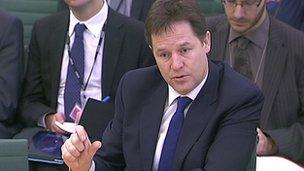Nick Clegg: Coalition mid-term review 'to surprise on the upside'
- Published

Deputy PM Nick Clegg said the mid-term review would be a "candid, simple assessment"
The government's mid-term review will show that more of the coalition agreement than thought has been implemented, Nick Clegg has told MPs.
The deputy PM said he hoped that "on the whole" the audit of achievements would "surprise on the upside".
The review, published in the new year, would set out priorities for the second half of the Parliament, he said.
Mr Clegg said he had met David Cameron to discuss proposed new policies, which he promised would "break new ground".
Labour said the country needed a "change of direction" not "another PR exercise".
The deputy prime minister was appearing before MPs on the political and constitutional reform committee.
'New initiatives'
He said that the mid-term review would look at what had been achieved compared with "what we set out to achieve in the coalition agreement".
"I think it's right that at this halfway point we judge ourselves against our own benchmarks.
"In some areas we'll be able to show that we have overachieved and in other areas where we have not achieved as much as we would have liked."
It would be a "candid, simple assessment", he said. "But on the whole I hope it will actually surprise on the upside. We have achieved a great, great deal of the coalition deal, in terms of implementing it."
He said coalition discussions were continuing about "what new initiatives we want to highlight... as important new steps in the second half of the Parliament".
Without going into the detail of them, he said they would be "very much flowing from many of the policy" directions already established "but extending them further".
'Out-of-touch'
The Institute for Government welcomed details of the mid-term review.
The think tank said the coalition agreement had proved useful to civil servants by "clarifying the policy compromises and shared values underpinning the coalition".
But its importance had "waned" over time in part because of the need to focus on the economic downturn.
"The mid-term review should be clearer than the original programme about prioritisation and should outline progress to date as well as look forward and include an action plan and timeline for implementing remaining and new pledges," the think tank said.
But Labour vice-chairman Michael Dugher said David Cameron's record was one of "failure".
"However they try and dress it up, David Cameron and Nick Clegg can't hide the true record of their out-of-touch and incompetent government."
Boundary review
Mr Clegg also defended his pledge to oppose changes to Westminster constituency boundaries.
The Lib Dems want to postpone the review to cut the number of MPs - a flagship Conservative policy - for a "full parliamentary cycle", after failing to get the backing of Tory MPs for House of Lords reform.
The prime minister has said he wants to push ahead with the plans, which would see the new boundaries implemented from 2015.
Mr Clegg told the panel of MPs that boundary changes were a "dead issue" for the current Parliament.
Last month the government dropped a Lords vote which could have delayed boundary changes until 2018, telling peers "senior members of the government" needed to discuss the issue before peers could hold the vote.
Lib Dem peers have said they would back Labour on the issue.
Mr Clegg told the committee this did not contravene the coalition agreement because there was "no fixed timetable" for boundary reform.
He rejected accusations by veteran Conservative MP Christopher Chope that the Lib Dems had breached the ministerial code by not upholding collective responsibility - the principle that ministers must publicly support all governmental decisions made in cabinet.
"It is entirely unreasonable to expect collective responsibility to be applied to something which hasn't been agreed by everybody," he argued.
Turning to Lords reform, the Lib Dem leader conceded the policy was "dead for the time being" but said it would have to be addressed by future Parliaments because the size of the House was "unsustainable".